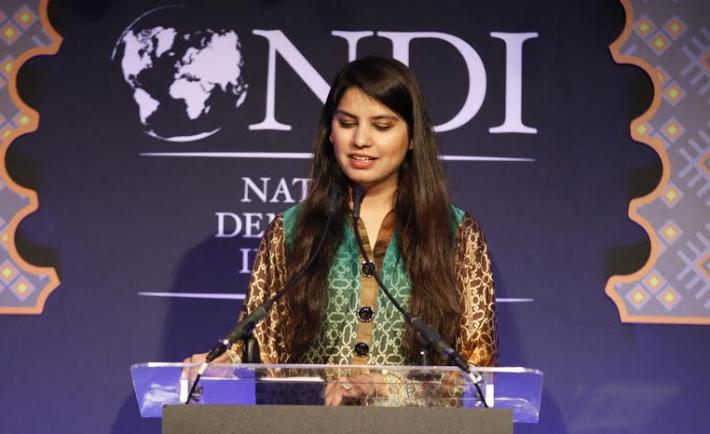When I was offered the opportunity to be part of the Andi Parhamovich Fellowship (APF), it seemed as if my dreams had come true. It was a tough competition but I was confident in my project on Integrating Platforms of Pakistani Political Parties with CEDAW Principles and the SDG5 Target[1]. I would do this by working with the major political parties in Pakistan, to educate, advocate and motivate them to incorporate the agenda of achieving political equality between women and men within their parties; and to urge them to work for achieving the CEDAW and SDG5 targets through their manifestos, programs and policies. But first I needed to understand the barriers that countries faced in implementing their commitments to eliminating all forms of discrimination against women as CEDAW required - and the APF helped me to do that.
How did I come to understand what has become my mission in life? Well, I come from a social context in Pakistan where, like in all developing countries, women’s vision and committed approach to a practical life goes through tough challenges. It can even start within a woman’s own family. Fortunately, my family stood by my ambition of joining social work as a profession.
When I joined NDI, I learned more about women, their capabilities and strengths, how valuable they are, what potential they have and how important women’s political parity is to the exercise of democracy. I learned that even a single, empowered woman—from a politician to an activist—can bring about phenomenal changes. My program experience at work led me to conclude that within political parties there was a need for increased women’s political engagement. I was immensely inspired by some of the women from the underprivileged areas, who would come to Islamabad from far flung regions, and were relatively active and empowered. I was amazed by their deep interest in educating their fellow women, and I remained in consistent contact with them.
For me, the APF was more than an emblem of the continuation of the struggle Andi left for us as a legacy. I had already read about Andi’s dedication to the promotion of global democracy through good governance and women’s empowerment, so my vision for this fellowship was very clear. However, from the very start of the fellowship in Washington DC, my every experience turned out to be something beyond what I had imagined. Every day was full of opportunities that I surely wouldn’t have found if I hadn’t been here.
My first life-changing experience on the fellowship was to deliver my speech at Marietta College in Ohio — where Andi studied. Among a whole range of people that I met there, I had the privilege of meeting Andi’s family, who are amazing. Within moments, I felt like I was a part and parcel of their family. I believe they see parts of Andi in every Andi fellow, which is not only great and admirable on their part, but is an immense honor on mine. Delivering the speech also gave me the confidence to voice national issues from Pakistan on a global stage. I was really proud when a couple of newspapers showed interest in publishing my take on Pakistan’s equality issues.
The second life-changing experience was presenting my special remarks at the 2016 Madeleine K. Albright Luncheon. It was not just a verbal delivery of words, but rather, a moment when I was representing my country and sharing my opinion on the need for increased women’s political engagement. I also had the honor of being congratulated by the former Secretary of State Madeleine K. Albright - which proved to me that struggle is always rewarded.
On my return to Pakistan, I put into practice all the skills that I had learned while in Washington DC, on the Fellowship. Thanks to the Fellowship, I have been able to help junior staff to plan their time, prioritize their assigned tasks, and communicate better within the team. With regard to my project, the advocacy skills development I was exposed to meant that when I got back to Islamabad, I was able to explain to political party leaders the vital role of women in politics. They responded positively during my exchanges with them, some following up afterwards, so they could take the necessary actions to make commitments to SDG5 in their party manifestos. I have also managed to establish strong relationships with senior women political leaders and party activists, with the purpose of accessing, motivating and convincing more women towards their active participation in national politics.
The voice of women on the economy, community development and women’s health issues must inform all efforts for creating a supportive and enabling environment for women’s political participation and stronger democracies. I believe that the creation of such an an enabling environment cannot be achieved only within the national boundaries of a country. It must be supported and nurtured through links of international solidarity. Thus, the responsibility to create a supportive environment for women’s political empowerment and democracy, is a responsibility willingly shared by individuals like Andi Parhamovich and organizations like NDI. I am happy to be marked by the APF brand, and to work with my NDI colleagues in Pakistan and around the globe on this empowerment and democracy mission. It’s now firmly my own, and it’s not impossible.
[1]CEDAW is the UN Convention on the Elimination of all forms of Discrimination Against Women. SDG5 is the sustainable development goal committed to achieving gender equality and the empowerment of all women and girls.

